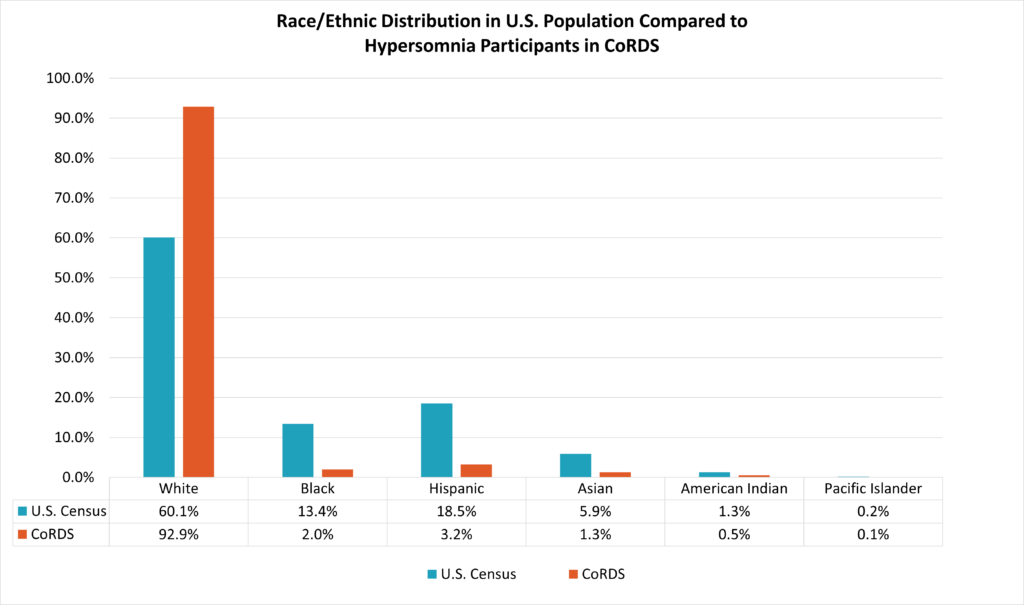SomnusNooze
 The Hypersomnia Foundation has long felt that welcoming everyone, regardless of ethnicity, gender, religion, or any other demographic, is essential to who we are, and must be incorporated into our efforts to raise awareness and reach undiagnosed patients. Yet, we are aware that most of the people who have found HF are primarily White, and that it is the responsibility of HF’s Board to examine diversity issues more closely. We recognize that our good intentions and statements of inclusiveness are not enough, and are asking ourselves, “What meaningful actions can we take?” We would like to share with you the results of our first action: measuring the extent to which the Hypersomnia Foundation is connecting with diverse racial/ethnic individuals.
The Hypersomnia Foundation has long felt that welcoming everyone, regardless of ethnicity, gender, religion, or any other demographic, is essential to who we are, and must be incorporated into our efforts to raise awareness and reach undiagnosed patients. Yet, we are aware that most of the people who have found HF are primarily White, and that it is the responsibility of HF’s Board to examine diversity issues more closely. We recognize that our good intentions and statements of inclusiveness are not enough, and are asking ourselves, “What meaningful actions can we take?” We would like to share with you the results of our first action: measuring the extent to which the Hypersomnia Foundation is connecting with diverse racial/ethnic individuals.
In the spring of 2020, the office at the U.S. National Institutes of Health (NIH) that conducts research on neurological disorders issued a Request for Information (RFI) asking interested parties to provide data on disparities in neurological disorders. The Hypersomnia Foundation chose to participate in this RFI as we believe that there are significant disparities in hypersomnia diagnosis and treatment. To participate, we needed to find out if there is evidence that disparities may exist.
While we do not have racial/ethnic data on everyone who has interacted with the Hypersomnia Foundation, we do have demographic data on those who have chosen to participate in our international patient registry at CoRDS. (For more information, visit the International Patient Registry at CoRDS.) The purpose of the analysis was to answer the question “Is the racial/ethnic makeup of the Hypersomnia Foundation community representative of the U.S. population?” If the racial/ethnic breakdown in CoRDS matches the racial/ethnic breakdown of the U.S., then we do not have evidence of a disparity. If, however, the racial/ethnic breakdown in CoRDS does not match the U.S. population, then we do have evidence that barriers may disproportionately affect specific racial/ethnic groups.

Our analysis determined that the racial/ethnic breakdown of CoRDS participants is significantly different than the U.S. population, providing evidence that disparities exist. While the 2000 U.S. census data shows that 60.1% of U.S. residents are White, 92.9% of hypersomnia patients in our CoRDS database are White. Blacks comprise 13.4% of the U.S. population, but only 2.0% of CoRDS participants are Black. Hispanics comprise 18.5% of the U.S. population but only 3.2% of CoRDS participants are Hispanic. The data in the remaining racial/ethnic groups is too thin to make a statistically valid conclusion, but what data there is suggests that these groups are also underrepresented.
Why are so few minorities in our CoRDS registry? While we could speculate a long list of contributing factors, we strongly believe that racial/ethnic minorities experience more barriers to diagnosis of sleep disorders than White populations. There may be additional barriers such as lack of insurance coverage or lack of access to sleep specialists preventing access to medications. Poor access to technology could be preventing people from finding the Hypersomnia Foundation and hearing about the CoRDS registry. Also, historical and/or cultural influences may be a factor in deciding whether or not to participate in the CoRDS registry.
Our CoRDS registry is one of the primary tools used to recruit individuals for clinical trials. Underrepresentation of racial/ethnic minorities presents a real problem when recruiting for clinical trials, where accurate representation of the patient population is desirable. Until we break down the barriers preventing people from receiving a diagnosis, learning about the Hypersomnia Foundation and choosing to participate in clinical trials, we will have concerns that emerging treatments have not been adequately tested in important populations.
The full Hypersomnia Foundation response to the RFI can be found HERE. The RFI includes additional analysis of hypersomnia by race/ethnicity and gender in the Veterans Health Administration database. Please be aware that the CoRDS analysis in this article differs slightly from the RFI, as we have found more recent census data and used a different cut of the data, which includes all forms of central hypersomnia (IH, narcolepsy and KLS) for this article.
If the issue of diversity in the Hypersomnia Foundation community is very important to you, here is a list of ways you can get involved:
- If you happen to be a member of a racial/ethnic minority and have not yet signed up for the International Patient Registry at CoRDS, please sign up today! If you are willing to participate in clinical trials and patient experience panels, researchers are very much in need of diverse participants.
- If your sleep doctor is of a racial/ethnic minority and isn’t in our Healthcare Provider Directory, please encourage them to sign up. Having a diverse community of clinicians may help us bring more diverse patients into our community.
- The outcome of the 2020 U.S. election is likely to have a major impact on several healthcare issues. Many of these issues affect access and affordability of healthcare and have a greater impact on underserved populations. Know the issues and where the candidates stand; then VOTE!
- Feel free to share this article, including the RFI, with your sleep doctor and primary care physician. Disparities in healthcare is a major topic in many health systems. Perhaps your doctors would be interested in the analysis or are looking for ideas on how to reduce disparities in their own practice.
So many people with rare sleep disorders report that it took years to get a proper diagnosis. We strive for a world where everyone with a sleep disorder has equal access to healthcare, recognition of their symptoms, testing, proper diagnosis and treatment.
